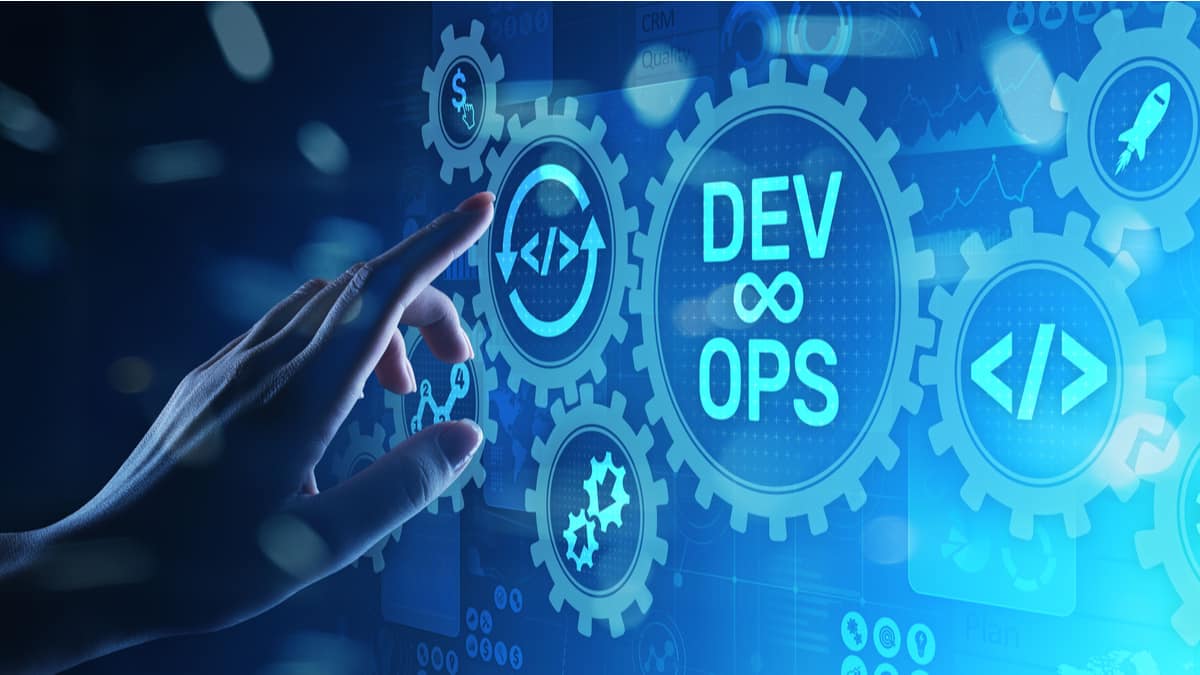Are you willing to take the plunge and move out of the traditional silhouette of being a generic software developer to something more exciting and professionally rewarding? Then DevOps is your best choice. The need for a DevOps Engineer is all-pervasive. Some of the biggest names in the industry like Netflix and Amazon look for DevOps Engineers. As exciting as it might sound, you need to have intrinsic knowledge of the subject matter at hand.
Introduction
According to a report by Glassdoor published in 2020, a DevOps Engineer is ranked as the #5 best job among the top 50 jobs. On LinkedIn, there are currently 160,026 results for the number of DevOps Job positions all across the world, and this number is sure to rise.
So, as an aspiring DevOps Engineer, it is important to have a fair idea as to what the companies are expecting out of you from a technical and non-technical point of view. Let us understand some of the core technical skills required. Before taking a stance on the DevOps Engineer skills, you may also want to check out free DevOps courses.
The Agile development model was developed from traditional models. From the Agile model, an innovative and improvised software development strategy was evolved, which is DevOps. Several big corporations and businesses are adopting DevOps to enhance their software development and quickly deliver their products and services.
So, what is DevOps? Why DevOps? You might’ve heard these terms in various software development fields. Here is an article for you to teach all the fundamentals of DevOps. The following are the topics we will cover in this DevOps tutorial:
If you wish to enrol in any course, Great Learning offers you one of the best cloud computing certification courses available in the market. This course is a Postgraduate Program in Cloud Computing, which teaches you everything you need to know about cloud services, including AWS, Azure, GCP, etc.
Let’s begin our DevOps tutorial without any further ado by starting with the “Introduction to DevOps” topic.
Top Skills required to become a DevOps Engineer
Core Technical Skills
- Hold Over Key DevOps Concepts
- Code Management Monitoring and Testing
- Knowledge Of Various DevOps Tools and Technologies
- Knowledge of Linux And Web Scripting
- Continuous Integration and Continuous Delivery
Hold Over Key DevOps Concepts
One of the best ways to start navigating the world of DevOps is by first understanding the key concepts associated with it. We must learn the core concepts comprehensively. The genesis of DevOps lies in finding a collaborative way to integrate two crucial pieces of a software company: Development and Operation.
So, if you are entering the world of DevOps, the first thing that you must understand is that your action is not independent. Here, you need to collaborate with the operations team in the development process. There is a high interoperability factor with DevOps meaning a member of the development must be sound enough to perform or assist operations tasks, and it goes the other way round too.
Code Management Monitoring And Testing
When we speak of coding and DevOps at the same length, one needs to understand that every developer comes up with tons of codes to develop that ideal product. If you want to be a part of an elite DevOps team, you must know some of the popular coding languages like Python.
One other thing is that if you are working as a developer, the amount of coding that would go into a project is humongous. Also, it is not only your code that needs to be managed, but your peers will also add on to the code. These codes need to be managed, integrated, and tested. So, it comes as a no brainer that a DevOps aspirant must be conversant with automation platforms handling each task.
For instance, the need to take care of source code management means that the developer must have knowledge of GitHub or allied coding repository services. The developers must continuously test and monitor them to avoid downtime in the production process.
Knowledge On Various DevOps Tools And Technologies
DevOps practices are practiced in various stages, and each stage has tools that can facilitate that stage. The main stages are
1. Source Code Management
Developers create and modify the software codes regularly. Source code management software is used to save the codes, merge new codes with the old ones, control the versions of the code, etc. It also helps to combine source code between team members. Commonly used tools are Git, Github, Gitlab.
2. Configuration Management
Configuration management is used to monitor software and operating system configurations. It also helps to handle configurations across thousands of servers. It is done by executing a single command on the management server or clicking a button. The configuration management tools use a remote connection to the target servers and push the configuration changes making life straightforward.
3. Continuous Integration
Continuous integration, abbreviated as CI, automates the code integrations from different developers into a single piece of software. The primary tools for Continuous integration are Jenkins and Bamboo.
4. Continuous Testing
Continuous testing is the process of minimizing feedback waiting time after testing the code. The code is examined in the development environment using automation testing tools, and the most common tools for Continuous testing are Selenium, TestComplete, and TestingWhiz.
5. Continuous Monitoring
Continuous monitoring is used to monitor the application’s performance, downtimes, error logs, etc. The main tools used for monitoring are Nagios, Zabbix, Splunk, etc.
6. Containerization
Containerization is the procedure of virtualizing an operating system that helps different containers running different applications to share the operating system and system resources. This is the opposite of traditional hardware virtualization, wherein the system hardware is shared among different virtual machines. The top providers of containerization are Docker, Kubernetes, and vagrant.
Knowledge of Linux And Web Scripting
As mentioned earlier, as a DevOps engineer, you must be familiar with at least one programming language. But you also need to understand that even if you do not know Linux, then regardless of which programming language you work in, you will face issues in various stages of product development. A very simple example to illustrate the shortcomings of not knowing Linux is as follows.
Suppose you are adding a component using the python programming, and the logic is not serving the functionality, so you watch videos online to figure out what’s the issue. But the catch is that in the video the instructor is using a Linux operating system, while you are working on Windows. This is a classic pitfall of not knowing Linux.
There are various other ways in which your growth as a DevOps Engineer can be stifled with the absence of Linux knowledge. Most of the DevOps automation tools have a Linux based architecture with the presence of mode, so inevitably for working with codes in any language, the knowledge of Linux and Linux scripting is essential. Check out this online DevOps course to get start with DevOps.
Continuous Integration And Continuous Delivery
Continuous Integration and Continuous Delivery shortened as CI/CD, is the essence of DevOps. It is the practice of continuously integrating all the code from different developers, testing them, and deploying the successful code to production. Deploying to production will mainly require spinning up new containers, which is again automated using scripts.
Non-Technical Skills
- Communication and Collaboration
- Decision Making
- Soft Skills
- Passion For Learning
- Proactiveness
Communication and Collaboration
Given its essential nature, communication and collaboration are crucial to succeed in the DevOps competition. These two are very important in breaking down the siloes between Dev and Ops teams, aligning teams’ goals to business objectives, and implementing DevOps culture cross-functionally.
Decision Making
Akin to the importance of decision making in various other career opportunities in technological landscapes, things remain the same for DevOps engineers as well. If you are aspiring to be a DevOps expert, for whom the companies will be writing fat paychecks, then along with technical skills, you also must have quick decision-making skills.
A lot of codes are written by your peers, and you must have the flair to accept and reject the coding snippets on the go to increase the speed of development. A faster rollout process means that you have the time to work on multiple projects, and attains maximum client satisfaction.
Soft Skills
Unsurprisingly when you are among some of the best DevOps Engineers the tech part will seem to become commonplace. The only thing that will be a differentiating factor is the extent of the soft skills that you have. You must be flexible, empathetic, and collaborative while dealing with the clients.
One other important thing is that you must be all ears to clients’ suggestions and not impose your line of thought. It essentially means in a harsher tone that you most often must keep your mouth shut and ears open.
The competitive nature of the business ecosystem has forced the companies to adopt an agile way of development methodology, and DevOps is a crucial part of which. It is also important to remember inculcating a new approach to working means effective communication and a strong soft skills base.
Also Read: Devops Interview Questions
Passion For Learning
Passion for learning is something that will take you through some tough competition. The more you learn, the better you get. In the world of DevOps, as a lead engineer, you must beware of very new tools that are out there to automate the development process.
Proactiveness
Overall, DevOps engineers should be proactive and passionate about work, directly reflecting performance and productivity. Moreover, staying updated with relevant technologies, new tools, and more is part of your process.
What are the career prospects for a DevOps Engineer?
Career prospects for a DevOps
The DevOps domain is getting attention for its role in building better communication, collaboration, and agility between software development and operations teams. The role of a DevOps engineer is hard to understand because it is the product of a dynamic workforce that has not yet stopped evolving.
DevOps is a software development strategy that bridges the gap between developers and their IT counterparts. It is a practice that aims to merge software development, quality assurance, and deployment and integration operations into a consolidated and continuous set of processes.
DevOps is a natural extension of Agile and other continuous delivery approaches. With DevOps, organizations can release tiny features quickly and incorporate the feedback they receive from stakeholders rapidly.
It’s good to note that DevOps is not merely a set of actions, but more a philosophy that facilitates cross-functional team communication.
What is DevOps Engineer?
DevOps engineers work with software developers and IT professionals to track code releases. They are the people who wear multiple hats – software development, deployment, network operations, and system admins. Teamwork stands at the core of a DevOps practice and the overall success of a process depends on the same.
As such, DevOps engineers are expected to have a thorough understanding of various concepts such as version control, serverless computing, integration, testing, and deployment.
The role of a DevOps engineer is formed out of the need of businesses to get hold of their cloud infrastructure in a hybrid environment. Organizations who work with DevOps spend relatively less time on managing configurations, deploying applications, and making tweaks and updates.
Are you interested to become a cloud devops engineer? Great! Here are a few things you need to know.
First, you’ll need to have a strong understanding of both development and operations. This means being able to code and deploy applications, as well as manage and monitor systems.
Second, you’ll need to be familiar with a variety of cloud platforms and technologies. You should know how to provision, configure, and deploy applications on these platforms.
Third, you’ll need to have strong communication and collaboration skills. This role requires working closely with both development and operations teams to ensure smooth application delivery.
If you have the skills and knowledge required, then becoming a cloud devops engineer could be a great career move for you!
The Skills Needed for a Successful DevOps Engineering Career
According to Puppet, the most critical skills for a DevOps engineer are:
– Coding and scripting
– Process re-engineering
– Communication and collaboration
*Out of these, process re-engineering is the most selling skill.
Other skills that can enhance a DevOps engineering career are:
– Software development, system administration, and an understanding of all basic IT operations.
– Experience and expertise with tools such as GitHub, Puppet, Jenkins, Chef, Nagios, Ansible, and Docker.
– Besides knowing off-the-shelf tools a DevOps engineer should also be well-versed with the basic coding and scripting languages such as Bash, PowerShell, C#, C++, Python, PHP, Ruby, Java, and so on.
– An understanding of database systems such as SQL and NoSQL database models.
– Communication and interpersonal skills are critical for a DevOps engineer since they have to ensure that the entire team behind a software works effectively and share and appreciate feedback to support continuous delivery.
The Roles and Responsibilities of a DevOps Engineer
In DevOps, there are frequent changes made to any software system which automatically entail testing and deployment. A DevOps Engineer is responsible to handle the IT infrastructure according to the business needs of the code deployed in a hybrid multi-tenant environment, needing continuous performance monitoring.
Therefore, a DevOps engineer must be aware of the various development tools which are used by software developers to write new code or enhance the existing code.
A DevOps engineer needs to collaborate with the team to handle challenges that spring up in the coding or scripting part including libraries and SDKs. A DevOps engineer handles code that needs to fit across multi-tenant environments, including the cloud.
Here are the roles and responsibilities of a DevOps engineer, in a nutshell:
– Apply cloud computing skills to deploy upgrades and bug fixes across AWS, Azure, or GCP.
– Design, develop and implement software integrations on the basis of user feedback and reviews.
– Troubleshoot and resolve production issues and coordinate with the development team to simplify and streamline code deployment.
– Implement automation frameworks and tools – CI/CD pipelines.
– Manage the IT infrastructure, which comprises the network, software, hardware, storage, virtual and remote assets, and control over data cloud storage.
– Continuously monitor software environments for any loopholes.
– Analyze code continuously and communicate detailed feedback to software development teams to ensure improvement in software and timely completion of projects.
– Collaborate with team members to improve engineering tools, systems, procedures, and security arrangements.
– Optimize and enhance the business’ computing architecture.
– Conduct system checks for security, availability, and performance.
– Develop and maintain troubleshooting documentation to keep up with past and future fixes.
Apart from these explicit set of actions, DevOps engineers are also expected to follow the essential DevOps principles:
– Culture inherent in the need for communication, collaboration, and technical processes and tools.
– Automation of processes
– Measurement of the Key Performance Indicators
– Sharing feedback, knowledge, and best practices.
How Much Does a DevOps Engineer Earn?
The job of a DevOps engineer ranks #2 on Glassdoor’s Top 50 Jobs in America. Also, the role of a DevOps engineer has witnessed a jump of 225 per cent in postings on Indeed. An important question that occurs among the DevOps aspirants is What is DevOps Engineer Salary?
Glassdoor mentions that the average salary of a DevOps engineer in India starts from INR 5.65 lacs per annum for an average of two years experience. For the same set, PayScale suggests that the average salary of a DevOps engineer is around INR 6.6 lacs per annum. PayScale also mentions that pay is also a function of the skill sets acquired by a DevOps Engineer. Also, most of the professionals in DevOps move to other related roles in a span of 10 years.
It is safe to say that a DevOps engineer’s job is quite in demand as businesses try to become more agile and take on continuous delivery approaches over long development cycles.
History of DevOps
Before DevOps, organizations developed software using two approaches, Waterfall and Agile. Let’s discuss these approaches in brief.
Waterfall Model
- A linear model that follows the top-to-bottom approach
- It consists of five phases: Requirement Analysis, Design, Development, Testing, and Maintenance
- It is simple to understand and implement, which are suitable for small projects
- Let’s discuss some disadvantages of the waterfall model approach:
- Lots of risks and uncertainties
- Not ideal for large and complex projects
- It was burdensome to make any changes as we cannot go to the previous phase once it is completed
- It consumes plenty of time to make any changes and must start from the initial phase
- You can check the end-product only at the end of the cycle
Agile Development Model
- Iterative-based software development approach, which is divided into several iterations
- Each iteration consists of five phases, the same as the waterfall model: Requirement Analysis, Design, Development, Testing, and Maintenance
- In the 1st iteration, the company releases a prototype with high priority features
- The clients provide feedback about the prototype
- In the 2nd iteration, you make all the necessary changes from the feedback
- This process is implemented and carried on until the desired product is achieved and the client is satisfied
- It best suits for large and long-term projects
- Easy to manage as it requires minimum resources
- The development and quality was improved
- Agile introduced Continuous Integration (CI) and Continuous Delivery (CD)
- Let’s discuss some disadvantages of the agile model approach:
- This model is highly dependent on the customers’ requirements and lacks proper documentation
- Delivery time was quite troublesome to predict for large projects
- Risk maintenance was increased
- Increased the gap between development and operations teams
To bridge the gap between development and operations teams, DevOps was introduced and evolved from Agile. DevOps added several new processes and tools, which helped enhance the iterative development and automation of CI/CD to the software development life cycle. It helped in the close collaboration of development and operations teams all the way through the software development life cycle.
DevOps and Agile worked together and helped enhance customer experience, increase an organization’s capacity to innovate their products and services, and deliver their services faster with more efficiency and reliability.
Moving onto the next topic, let’s discuss why DevOps matters in software development.
Why is DevOps needed?
One of the main reasons to integrate DevOps is because, without this, the development and operations team work in complete isolation. Testing and Deployment were considered to be isolated activities that are done after the design-build. Without DevOps, teams would be spending time in activities such as testing, deploying, designing, while their focus should be on building the project.
Making use of a manual code in deployment can also lead to human error in production, causing a delay in outcomes. Another point to consider is that only 17% of teams can use delivery software fast enough. This proves our pain point.
In certain DevOps models, quality assurance and security teams merge with development and operations teams for the entire application lifecycle of the software development. This is often referred to as DevSecOps.
One of the most significant reasons why DevOps matters is because the software and the internet have transformed various sectors and industries across the globe, such as shopping, entertainment, banking, government, automobiles, airlines etc. Software no longer solely supports a business. Instead, software becomes an essential component of all the aspects of a business.
Companies interact with their customers through online services, applications, or several other devices. Companies also use software to increase and improve their operations by transforming logistics, communications, and procedures. Similarly, physical goods companies transformed how they design, build, and deliver products with the help of industrial automation.
DevOps helps these companies and various other organizations to automate their processes using several DevOps tools. These tools help in accomplishing their tasks efficiently and reliably.
DevOps vs Traditional IT
Let’s take a look at the difference between traditional IT and DevOps.
| Traditional IT | DevOps |
| Development team works on testing. Operations team works on paperwork required. | Both teams work together, thus, resulting in better visibility of infrastructure requirements. |
| Projections regarding redundancy, data center locations and storage requirements are skewed. This is because of no inputs from the developers. | Projections regarding redundancy, data center locations and storage requirements are accurate as there is information from the developers. |
| Both the teams continue monitoring their plans separately and have little knowledge regarding each other’s progress. | Both teams work jointly and develop a plan that works towards business and IT needs. APM (Application Performance Monitoring) tools can also be used. |
| Chances of load testing crashes are high, due to which there can be a delay in release. | Development team is able to fix crashes on time, causing no delays. |
Advantages of DevOps
Speed
DevOps moves at a higher velocity. Thus, organizations can innovate for customers faster, they can adapt to the changing market requirements, they can grow efficiently. A DevOps model ensures that your development and operations team can achieve the desired results at a faster speed. An example of this would be how microservices and continuous delivery allow their teams to take ownership of services. Thus releasing updates to them quicker than others.
Rapid Delivery
It helps in increasing the frequency and pace of your organization’s releases. This allows you to innovate and improve your product at a much faster rate. Being able to fix bugs faster, and release new features faster means that you can respond to customers needs. This can help you in building a competitive advantage.
Reliability
DevOps is more reliable. It ensures the quality of application updates, thus enabling delivery at a rapid pace while still maintaining a positive experience for the customers/end-users. The monitoring and logging practices available in DevOps allow you to be informed about the real-time performance.
Scale
It helps you to manage the infrastructure processes on a large scale. Automation can consistently help in managing complex or changing systems efficiently and also with reduced risk. DevOps practices such as infrastructure as code allow you to manage testing, production environments in an efficient and repeatable manner.
Improved Collaboration
One of the biggest advantages of DevOps is that it helps you build an efficient team. You can build this under a cultural model that emphasizes values such as accountability and ownership. The operations and developers teams collaborate in close context and share numerous responsibilities. They also combine their workflows and can reduce any inefficiency. There is a reduced handover period between the two teams.
Security
There is a greater amount of security. Your team can adopt a DevOps model with no sacrifices made towards security. Automated compliance policies, fine-grained controls, and configuration management techniques are utilized. It also offers a lower failure rate and offers a reduction in defects across the entire lifecycle.
Cost Efficiency
The software development process is made easier due to its cost-efficiency. It is more stable, secure, and changes are auditable. This is a huge plus point for any IT management team or organization.
DevOps Life Cycle
There are four critical phases in the DevOps life cycle. These phases are not role-specific, and they rely on each other. Let’s learn more about DevOps stages and tools below:
- Plan
In this phase, DevOps teams plan or ideate, define, and describe strategies and features to build an application. The main objective of this phase is to improve the business value of the application with the latest features, resulting in producing a desirable end-product.
Tools: Jira, Confluence, etc.
- Develop/Test
This phase includes the application’s programming, where developers code, test, and build new, enhanced features. DevOps teams try to innovate and improvise the products without compromising quality, stability, and productivity. This is achieved through continuous testing and continuous integration.
Tools: Git for coding; Apache Ant, Maven, and Gradle for building; Selenium and JUnit for testing.
- Deliver/Deploy
In this phase, applications are deployed into production efficiently and reliably. This phase focuses on Continuous Integration and Continuous Delivery. The teams here release all the management processes with clear manual approval stages. They help in automating these processes to make them scalable, repeatable, and controlled. DevOps teams can deliver the applications frequently with ease and confidence.
Tools: Jenkins for Continuous Integration; Docker and Kubernetes for Containerization; Ansible, Chef, and Puppet for Continuous Delivery.
- Operate
This phase includes maintenance, monitoring, and troubleshooting applications in production environments. This phase focuses on Continuous Monitoring. DevOps teams in this phase ensure system reliability, high availability, and zero downtime during the enforcement of security and governance. Teams monitor the performance of the deployed applications in the production and receive clients’ feedback on the applications.
Tools: Nagios, Splunk, etc.
DevOps Practices
Let’s discuss some of the practices in DevOps culture:
- Continuous Integration (CI)
Continuous Integration is a software development practice in which the developers frequently integrate their code modifications into a central repository and later run the automated builds and tests. The key objectives of continuous integration are finding and addressing bugs quicker, improving software quality, and reducing the time it takes to validate and release new software updates.
- Continuous Delivery (CD)
Continuous Delivery is a software development procedure where code modifications are automatically built, tested, and released into the production environment. It is an extended practise of continuous integration where it deploys all code modifications to testing or production environments after the code is built. When continuous delivery is implemented correctly, developers will always have a deployment-ready build artefact, which is passed through a standardized test process.
- Microservices
Microservices is an architectural approach that builds and structures an application as a set of small services. It is also called microservice architecture. Each service is highly maintained and tested, loosely coupled, independently deployed, and organized around several business capabilities. All the services are owned and managed by a small team. The microservice architecture facilitates the rapid, frequent, and reliable delivery of complex and large-scale applications. It also allows an organization to expand its technology stack.
- Continuous Testing
Continuous Testing is a software testing practice that involves automated software testing at all the stages of the software development life cycle. It aims to evaluate software quality at every phase of the continuous delivery process by testing periodically.
- Infrastructure as Code
Infrastructure as code is a practice where the infrastructure is maintained and managed with the help of code and software development techniques, like version control and continuous integration. The API-driven model of the cloud facilitates developers and system administrators to interact with infrastructure programmatically and at scale instead of setting up and configuring resources manually. Hence, engineers can configure infrastructure with the help of code-based tools and treat infrastructure like treating application code. As they are defined by code, developers can easily deploy infrastructure and servers using standardized patterns, which are updated with the latest patches and versions or duplicated repeatedly.
- Configuration Management
Developers and system administrators use code for automating the operating system, host configuration, operational tasks, etc. Using code makes configuration modifications repeatable and standardized. It helps in freeing developers and systems administrators from manually configuring operating systems, system applications, or server software. Configuration Management enables developers to establish and maintain consistency in the functional requirements and performance of an application.
- Continuous Monitoring
Continuous Monitoring is referred to as the automated process and technology necessary to include monitoring or tracking across all the phases of your DevOps and IT operations lifecycles. It is a vital stage in the DevOps life cycle. It helps to constantly ensure your application and infrastructure’s health, performance, and reliability as it moves from development to production. Continuous Monitoring expands upon Continuous Integration and Continuous Deployment (CI/CD) concepts, helping you develop and deliver software quickly and more reliably for providing continuous value to your users.
- Communication and Collaboration with Visibility
Increased communication and collaboration with visibility in an organization are some of the key cultural aspects of DevOps. DevOps tooling and automation of the software delivery process initiates collaboration by physically gathering the workflows and responsibilities of development and operations teams. Moreover, these teams set strong cultural standards around information sharing and facilitating communication using chat applications, issue or project tracking systems, and wikis. This helps improve and increase the communication speed across developers, operations, and also other teams like marketing or sales, enabling every part of the organization to coordinate more closely on goals and projects.
- Shifting in Scope and Availability
As teams coordinate with each other, they take ownership and become involved in not just the ones specific to their roles but also in additional lifecycle phases. For example, developers are responsible for not only the innovation and quality introduced in the development phase but also the performance and stability their modifications bring in the operation phase. Simultaneously, IT operators ensure governance, security, and compliance in the planning and development phases.
- Short Release Cycles
When DevOps teams release software in short cycles, they remain agile, where they try to move quickly and easily. Shorter release cycles make planning and risk management simpler because the progress remains incremental, reducing the impact on system stability. Shortening the release cycle also enables organisations to adapt and react to evolving customer requirements and competitive pressure.
- Continuous Learning
DevOps teams whose performance is at par build a growth mindset. They fail quickly and integrate learnings into their processes, constantly improving and increasing customer satisfaction, and promoting innovation and market adaptability. DevOps is a journey that has continual growth.
Use Cases of DevOps
1. Application of DevOps in Online Financial Trading Company
Testing, building, and development of methodology was automated in the financial trading company. With the help of DevOps, deployment was done within 45 seconds. Earlier, the same deployments would take up to days or weeks to be completed. Thus, the overall time of the process has reduced, making the process smoother and increasing the interest of clients.
2. Application in Car manufacturing Industry
With the help of DevOps, employees can help car manufacturers catch any error in scaling the production. Earlier, this was not possible.
3. Benefits to Airlines Industry
The united airlines have saved close to $500,000 with its change to a continuous testing standard. With the help of DevOps, it has also been able to increase its coverage of code by 85% compared to before.
4. Bug Reduction of DevOps
With the introduction of DevOps, bugs have reduced by close to 35%. Using this, Rabobank was able to provide a better quality of applications to their customers and clients within a shorter period as it massively reduces the time taken during regression testing.
Also Read: Career Opportunities for DevOps Engineers in India
5. Faster development of software
DevOps helps in faster delivery of applications. This is due to speedy delivery. The faster development of software helps in the overall development and functioning of your organization.
Moving onto the last topic of our DevOps article, let’s see who precisely a DevOps engineer is.
Who is a DevOps Engineer?
A DevOps Engineer is a professional who has an outstanding knowledge of the Software Development Life Cycle (SDLC) and establishes processes, tools, and methodologies to develop CI/CD pipelines. The DevOps engineer is responsible for provisioning, operating, and managing cloud environments.
They balance client requirements from coding and deployment to maintenance and updates. The engineer works closely with development and IT operations teams, where their skills and goals can be distinct. Developers try to establish new features to an application, while operations teams try to maintain the stability of an application once it is deployed into the production environment.
If you are considering a career as a DevOps engineer, upskill yourself with Great Learning’s DevOps Engineer Certificate Program
Ending Note
To succeed in the DevOps career path, you must have a balance of technical knowledge, and innate soft skills. These two crucial properties work in tandem to help you grow. The technical knowledge will help you to create a highly productive DevOps infrastructure. On the other hand, soft skills will help you provide the utmost client satisfaction.
If you wish to learn DevOps and more such concepts, you can upskill with Great Learning’s Cloud Computing Courses and unlock your dream career.











